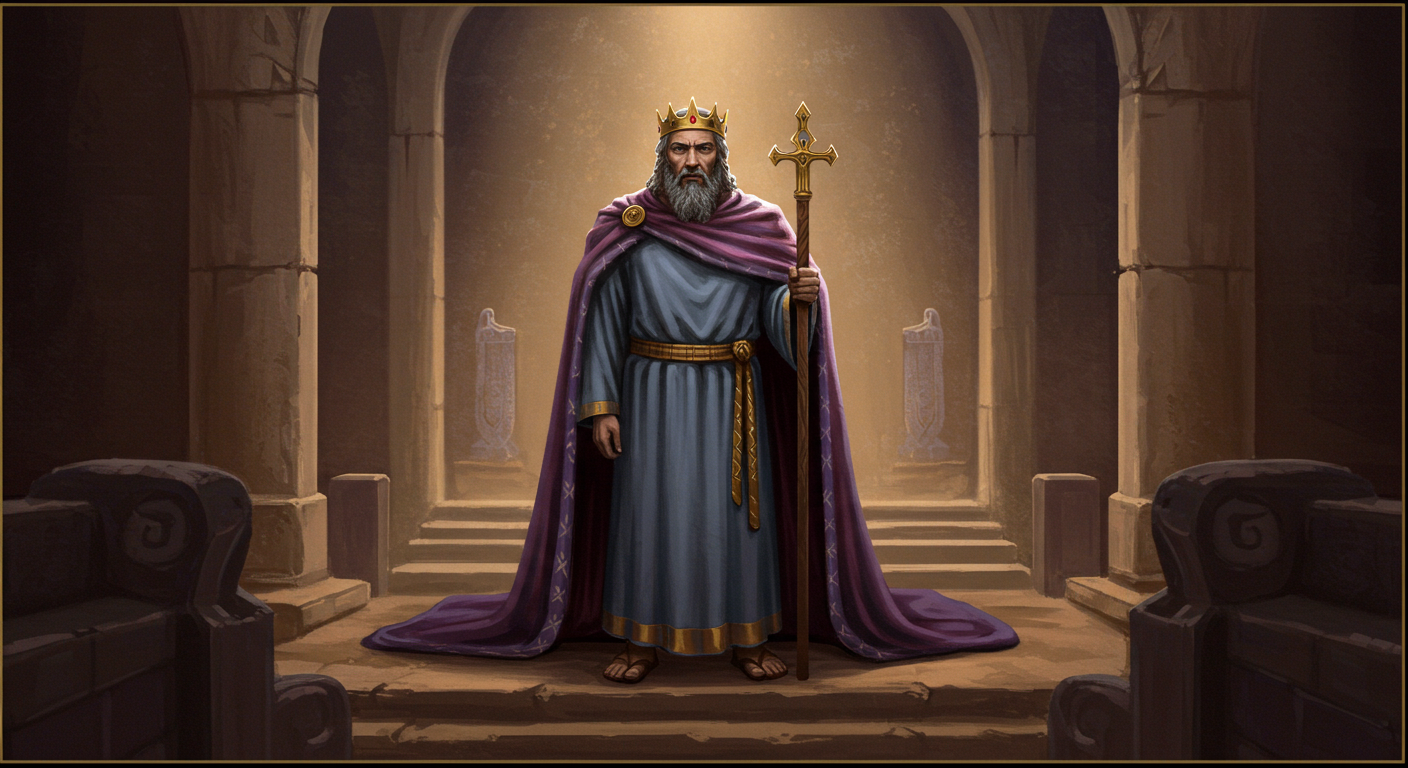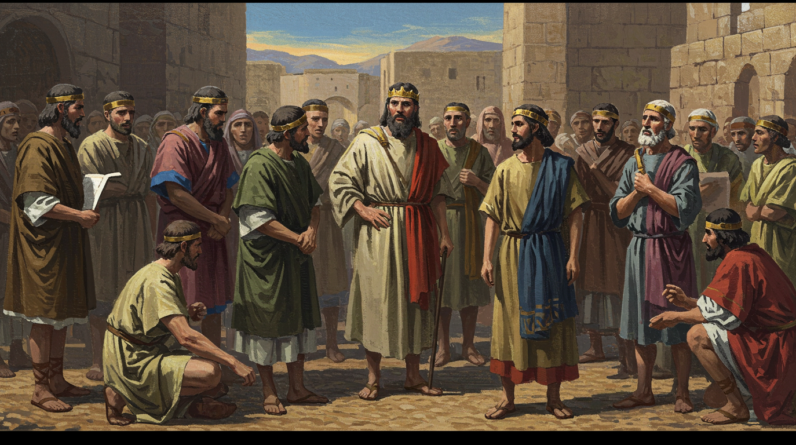Explore Solomon’s legendary wisdom and wealth in this post, a rich tale of ambition, leadership, and humanity’s enduring quest for fulfillment and understanding.
Solomon: The Wise King of Israel

Introduction
Hook: Have you ever imagined what it would be like to possess legendary wisdom and unparalleled wealth, only to discover that they don’t guarantee the fulfillment of your deepest desires? This is the tale of Solomon, the wise king of Israel.
Brief Overview: Solomon is an iconic biblical figure known for his astounding wisdom and reign over Israel during a time of unprecedented prosperity. As the son of King David and Bathsheba, Solomon’s leadership left an indelible mark on history, characterized by grand achievements, profound lessons, and complex enigmas that continue to fascinate historians and biblical scholars today.
Thesis Statement: This article delves into Solomon’s impact on Israel’s history, exploring the leadership style that earned him a reputation as one of the wisest men in biblical lore. Through his story, we’ll unearth timeless lessons on wisdom, ambition, and the human condition.
Historical and Cultural Context
Israel during Solomon’s Time: In Solomon’s era, Israel was emerging as a formidable kingdom in the ancient Near East. The nation was transitioning from the tribal confederation under Saul and David into a centralized monarchy with Jerusalem as its capital. This period was marked by political consolidation, the establishment of a professional army, and extensive international trade.
Setting the Stage: Solomon ascended the throne at a time when the Israelites were longing for stability and peace after King David’s military campaigns. The spiritual climate was one of fervent loyalty to Yahweh, yet it was also a period ripe for syncretism as neighboring cultures exerted influence. Solomon’s rule came to be seen as providential, a symbol of renewed hope and divine promise for the nation.
Biographical Overview
Early Life and Calling: Solomon’s early life is shrouded in intrigue, notably because of the circumstances around his birth and David’s complex family dynamics. Solomon was not the eldest son, but David’s promise to Bathsheba and God’s divine choice (as revealed by the prophet Nathan) positioned him for kingship.
1 Kings 1:28-30 describes the pivotal moment when David publicly affirmed Solomon’s succession.
Major Milestones and Events:
- Solomon’s Wisdom: Solomon’s request for wisdom over wealth and power is a defining moment in his life (1 Kings 3:5-14).
- Building the Temple: The construction of the Temple in Jerusalem was a monumental project that symbolized religious centralization and national unity (1 Kings 6).
- International Relations: Solomon’s diplomatic marriage alliances and trade partnerships with neighboring nations expand his influence and accumulated wealth (1 Kings 10).
Key Biblical Narratives and Passages
Primary Scripture References:
- 1 Kings 3:5-14 – Solomon’s request for wisdom at Gibeon.
- 1 Kings 6 – The building of the Temple.
- 1 Kings 10:23-29 – The Queen of Sheba’s visit to Solomon.
- 1 Kings 11 – Solomon’s apostasy and the consequences.
Contextual Analysis: These narratives highlight Solomon’s transformation from a divinely favored king endowed with wisdom and wealth to a sovereign whose later years were marred by political alliances that led him away from his fidelity to God. The Temple stands not just as an architectural feat but as a spiritual emblem, while his interaction with the Queen of Sheba underscores his widespread fame. Yet, the narrative also warns of the fragility of human wisdom when untethered from divine guidance, a message resonant with theological implications.
Leadership Qualities and Challenges
Core Leadership Traits: Solomon’s wisdom was unparalleled, and his judicious decisions, such as the famous judgment involving two women and a baby (1 Kings 3:16-28), served as testaments to his discerning nature. He was known for his organizational prowess, as evidenced by his extensive projects and effective governance systems. However, Solomon’s curiosity and intellect extended beyond divine principles, leading to an eclectic religious outlook that would challenge his spiritual fidelity.
Challenges and Controversies: Despite his divine-given wisdom, Solomon’s reign was not without moral quandaries. His penchant for forming political alliances through marriages to foreign women brought religious compromise and eventual idolatry (1 Kings 11:1-9), which sowed seeds of division within the kingdom. His lavish lifestyle and labor demands also led to societal discontent, foreshadowing the kingdom’s division after his death.
Legacy and Impact
Immediate Impact: Solomon’s reign transformed Israel into an economic powerhouse and a cultural beacon. The Temple positioned Jerusalem as the spiritual heart of the Jewish faith, while his proverbial wisdom inspired generations and was immortalized in biblical literature such as Proverbs, Ecclesiastes, and the Song of Songs.
Long-Term Influence: After Solomon’s death, the once-united kingdom split into Israel and Judah, weakened by internal strife and external threats. Nevertheless, his legacy of wisdom endured, continuing to influence religious, philosophical, and cultural spheres beyond the Hebrew Bible. Solomon remains a figure of both admiration for his discerning mind and caution against the perils of moral complacency.
Modern Relevance: Contemporary leaders and thinkers may draw lessons on the balance of wisdom and the temptations of power from Solomon’s story. His life is a poignant reminder that even the most sagacious and capable leader must remain anchored in ethical and spiritual convictions to truly thrive.
Scriptural and Scholarly Analysis
Comparative Analysis: When examining Solomon’s narratives, varied emphases emerge between the accounts in Kings and Chronicles regarding his achievements and failings. Kings provides a more nuanced depiction of Solomon, addressing both his triumphs and his failings, while Chronicles often idealizes his reign, focusing on the construction of the Temple and his wisdom (compare 1 Kings 11 and 2 Chronicles 9:22-31).
Theological Implications: Solomon’s story invites theological reflection on the nature of wisdom and the consequences of deviating from divine precepts. The juxtaposition of wisdom and folly, faithfulness and apostasy, highlights the enduring struggle between sense and sensibility within human nature. Biblical scholars often debate these themes, offering insights into the complexities of biblical kingship and covenantal theology.

Conclusion
Summary of Key Points: Solomon’s legacy is both illustrious and paradoxical. His wise rule yielded prosperity and architectural marvels like the Temple, yet his moral failings sowed discord that fragmented the kingdom. His life embodies the duality of wisdom and folly—an enduring narrative of human endeavor striving to align with divine purpose.
Final Reflections: In revisiting Solomon’s story, we are reminded that wisdom without virtue can lead to ruin. His life serves as a testament to the importance of steadfastness to one’s faith, reinforcing the timeless adage that true understanding begins with reverence for God.
Call to Reflection or Action: Reflect on Solomon’s journey, considering how his life challenges us to seek wisdom while anchoring it in ethical conviction. For those eager to explore further, I invite you to continue delving into the rich tapestry of biblical history, discovering the insights it offers.
References and Further Reading
Biblical References:
Acknowledgment:
All Bible verses referenced in this article were accessed via Bible Gateway (or Bible Hub).






